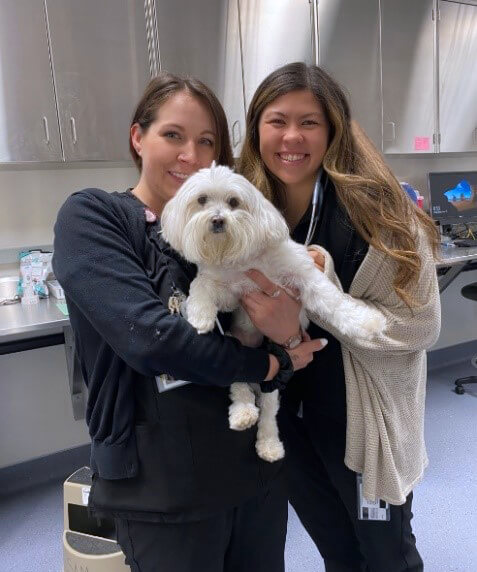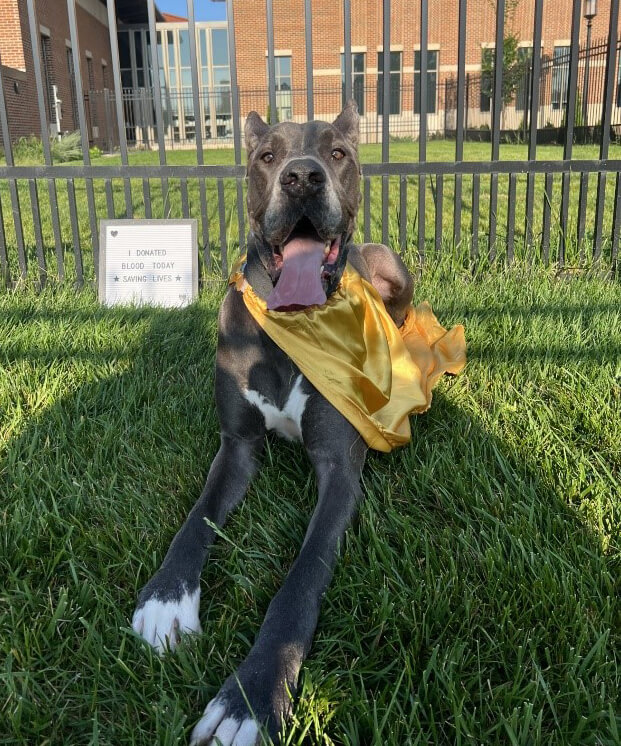A community advancing the health and quality of life for animals, together.

Not all heroes wear capes. And then again some do.
With a lightning bolt streaking down the back or an upturned collar draped across the chin, caped creatures at this time of year bring to mind bags of candy and crunchy leaves underfoot. Now that the spookiest of seasons is upon us, if your house is more trick than treat, the thought of blood may make the hairs on your neck stand on end. But for a pet in the Purdue University Veterinary Hospital’s Blood Donor Program, a furry cape marks an unsung hero and blood is certainly no trick.
Just like their human companions, pets can lose large amounts of blood due to trauma, surgery, or disease and require a life-saving blood transfusion. While many of us would gladly volunteer to donate blood for such a purpose, in the case of pets, this gift is one only a fellow pet can provide. With the demand for donations constantly growing, the College of Veterinary Medicine is meeting this critical need through with the hospital’s Blood Donor Program.

Begun in the early 1990s as an internal program for the Veterinary Hospital, the blood bank now relies on healthy pets from the local community to provide this vital resource that’s making a big impact in the lives of animals in need. Just one donation can help save up to three patients. The program currently has 21 canine and seven feline blood donors and is actively recruiting additional healthy pets – with canine donors needed the most.
Over the years, this program has helped save hundreds of pets’ lives, including a little Maltese named Flower who came in through the Veterinary Hospital’s Emergency and Critical Care Service for the first time in the fall of 2020. With help from the hospital’s Small Animal Internal Medicine Service, Flower was diagnosed with immune-mediated hemolytic anemia (IMHA), which meant her immune system was destroying her own red blood cells.
IMHA is a very challenging disease and dogs may have symptoms like fatigue, pale or yellow gums, collapsing, and rapid heart rate. Flower’s treatment of IMHA included an initial blood transfusion to help increase her red blood cells and stabilize her for further treatment.
One of the program’s emergency blood donors, a greyhound named Sosuke, was called in to donate blood for Flower. Within minutes, this life-saving resource was given to Flower and she immediately began to improve over the next few days under the hospital’s care.

With two blood transfusions along with medications to help manage her immune system, Flower rebloomed. Her disease improved, she was reunited with her family, and she continues to be a perennial favorite at the Purdue University Veterinary Hospital where she returns for her annual check-ups – all thanks to the dedicated animals in the Blood Donor Program.
For pet owners interested in their dog or cat participating in the program, the pet must meet an initial set of requirements, including age, weight, and health. Donors must be one- to five-years-old and weigh a minimum of 50 pounds for a dog and 10 pounds for a cat. If initial eligibility requirements are met, the pet will then undergo a health screening conducted by the program’s dedicated team of veterinary nurses.

Canine donors accepted into the program are required to donate a minimum of four times a year, with most donating every two months. Some dogs with a universal blood type also may provide emergency donations as needed. Cats participating in the program are only used for emergencies and serve on an on-call basis a minimum of one to two months during the year. The program care team diligently plans an annual schedule that prioritizes animal welfare and well-being to ensure the donation process is a positive experience for the donors. Each donation session typically takes 10-minutes and pets receive plenty of treats, cuddles, and positive reinforcement.
In appreciation for pet owners and their blood donors, participants receive a variety of benefits including free annual exams and labwork from the hospital’s Small Animal Primary Care Service, as well as free annual vaccinations and preventatives. Owners also receive a $25 credit with each donation that can be used on hospital services not covered within the program and pets go home with a bag of pet food following each session.
To learn more about how you and your pet can make a difference in the lives of Veterinary Hospital patients in need, visit the Purdue University Veterinary Hospital’s Blood Donor Program website for additional information and to sign-up your four-legged hero.
